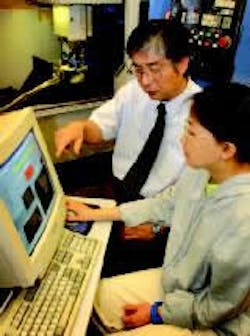Intelligent grinding process learns to do it right
Yung Shin (left) has been working on the intelligent grinding method for 15 years.
Researchers at Purdue University are working with industry to develop an intelligent system that improves precision-grinding processes. The system could save U.S. companies $1 billion annually in manufacturing costs.
"Precision grinding is an art that relies on the experience and knowledge of employees who have been in the business for years," says Yung Shin, a professor of mechanical engineering who is leading the Purdue portion of the research. "The problem is that many shops don't have enough of these experienced people, so grinding processes are often run under suboptimal conditions. Our system enables relatively inexperienced employees to operate grinding machinery with the same precision as highly experienced workers."
The intelligent optimization and control process uses artificial-intelligence software, which mimics how people think, to learn and adapt to changing conditions. Shin has been working on the method for 15 years.
With advanced software, such as neural networks and genetic algorithms, the intelligent system operates specialized CNC grinding machines and collects a wealth of data from various sensors as a part is being ground.
Such machines are widely used in industry and are increasingly equipped with sensors that provide real-time information about the grinding process.
The sensors collect information about details such as forces exerted on bearings, speed, vibration, and temperatures during various parts of the process. This information is captured in the software to populate a database that will be used to set the machine to optimal operating conditions.
TechSolve Inc., Cincinnati, is leading the team of industrial partners in a three-year, $6-million project funded through the National Institute of Standards and Technology's Advanced Technology Program.
Other industrial members of the team are Delphi Energy & Chassis Systems, Dayton, Ohio; Applied Grinding Technologies, Wixom, Mich.; and Landis Gardner, Waynesboro, Pa.
"Going from the lab to real-world applications won't be easy and will require a lot of hard work and diligence," says David Yen, manager of advanced manufacturing engineering at Delphi.
"Within three years, we will identify several pilot applications, all in automotive areas, and validate the methodology. Then we will extend the technology to other grinding applications."
